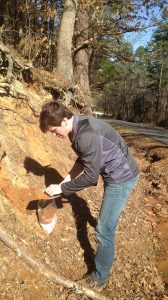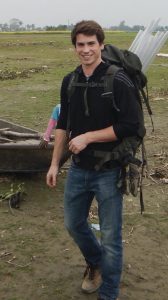The drinking water along the Meghna River in Bangladesh is tainted with arsenic, a toxic chemical that when ingested may lead to cancer, vascular disease and other health ailments. But one day soon, those waters could become safer to drink – thanks to the research of a University of Mississippi geology alumnus.
Thomas (Tom) Varner (BSG 19) is an environmental science and engineering Ph.D. student at the University of Texas at San Antonio. The South Bend, Indiana, native was recently awarded a Graduate Research Grant from the Geological Society of America.
Varner’s grant will assist the geological engineering department’s existing National Science Foundation-funded research, which examines the mechanisms that control the release and sequestration of arsenic along the Meghna River in Bangladesh.
“Millions of people in Bangladesh are afflicted with arsenic-contaminated drinking water derived from the groundwater,” Varner said. “Surface waters have become contaminated with pathogens due to dense populations and lack of sanitation practices. With no safe alternatives for drinking water, this research will further the understanding of the processes controlling the fate and transport of arsenic, which is imperative to providing possible solutions.”
Varner said that the GSA grant is confirmation that his research has a societal and academic significance outside the laboratory.
“This award was an honor to receive, but it represents a promise to adequately complete the study to benefit the academic community and those who suffer from inadequate drinking water,” he said.
Discovering His Passion
Varner’s interest in geology was born while hiking in Spain in 2015. There he realized that his passions for science and the natural environment could be merged through the study of geology. He changed his major from pharmacy to geology when he returned to Ole Miss.

Varner takes a sand sample from the McNairy formation located in Mississippi and Tennessee. Submitted photo by Jennifer Gifford
“Geology is a fascinating field involving the study of some of society’s most pressing issues,” Varner said. “As the human population grows, there is an increased strain on our relationship with the natural environment.
“Problems such as climate change, energy, mineral resources and water resources are all addressed through the study of geology. The application of the study of geology towards real-world issues provides a fulfilling line of work.”
Mining His Niche
As an undergraduate, Varner’s favorite engineering professors were Jennifer Gifford, assistant professor of geology and geological engineering; and Gregg Davidson, chair and professor of geology and geological engineering.
Varner and Gifford studied zircons (extremely durable heavy minerals often found as detrital grains in sedimentary rocks) to determine the Mississippi River’s age and tectonic environment of origin. The project, funded by an internal UM Summer Undergraduate Research Fellowship Track 1 grant, used detrital zircon age patterns as a tracer of sediment source.
“During this time, Dr. Gifford encouraged me to attend conferences to present my research and assisted in the processes of writing an internal grant to help fund the research. Both are crucial components of conducting research studies,” Varner said. “I am extremely grateful for the opportunities and experience I gained by conducting undergraduate research under Dr. Gifford.”
Gifford remembered Varner’s zeal for their research.
“Tom was very dedicated,” she said. “He worked very well in the field and in the lab.”
Moving toward the Mark
Other honors and awards Varner received as an Ole Miss student included Who’s Who Among Students in American Universities and Colleges, and Outstanding Senior in Geology, both in 2018. He also was named Outstanding Junior in Geology the previous year.
“Receiving the UM Undergraduate Summer Research Grant was monumental for my decision to continue with research,” Varner said. “Writing, and receiving, grants is an invaluable skill to have as a graduate student and as a researcher. Receiving this grant award as an undergraduate provided me with instrumental writing experience and confidence to pursue a graduate degree.”
Receiving the Who’s Who award proved to Varner that there was merit in the extra work that he took on.
“Receiving this award provided me with inspiration to pursue further education and helped develop my passion for geology, specifically the association between geology and human health,” he said.
After completing the Ph.D. program, Varner plans to pursue a career involving the management and protection of water resources.
“Water is required to sustain life and is a basic human right,” Varner said. “I would love to be in a position where I would be able to work towards providing clean and reliable drinking water for afflicted communities.”
Acknowledging His Ole Miss Engineering Experience
Varner said the education and research opportunities he received as an undergraduate in the School of Engineering at Ole Miss provided him with invaluable experience that has proved essential for his current research at the University of Texas at San Antonio.
“The foundation of knowledge that I received through the courses in the School of Engineering has provided me with the components necessary for further education and research,” he said.
“I am very grateful for the opportunity to conduct research as an undergraduate while at Ole Miss. The ability to conduct research as an undergraduate set the stage for my future, allowing me to apply the knowledge from courses to help answer research questions in the field of geology.”
